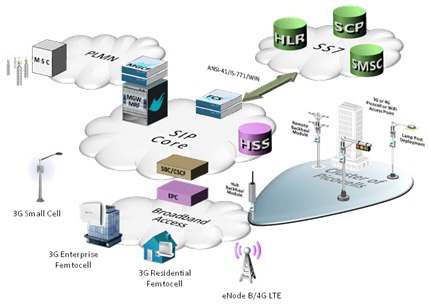With the demand for wireless and broadband solutions in rural and residential areas increasing at a rapid rate, the need for small cell deployments are growing as well causing operators and service providers to shift their focus toward increasing network capacity and coverage.
Just in time for Mobile World Congress (News - Alert) this week, the Small Cell Forum, just renamed after formerly being referred to as the Femto Forum (News - Alert), made a number of announcements in Barcelona, one noting that small cells will outnumber macrocells by the end of 2012, growing from 4.3 million small cells (including femtocells, picocells and microcells) which will be shipped in 2012, and rising to 36.8 million shipments in 2016, valued at $20.4 billion.
According to ABI Research (News - Alert), the source of these statistics, residential and enterprise models currently dominate small cell shipments with 62 percent and 30 percent respectively. ABI Research's data suggests that by 2016, while indoor small cells will make up 94 percent of total shipments, outdoor small cells will make up 64 percent of the revenue.

Taqua (News - Alert), a provider of next generation telecommunication systems and applications has evolved into a supplier of convergence switching, IP peering and most recently has expanded its business into providing small cell deployment solutions.
The company stands behind the notion that femtocell and other small cell solutions are a better strategy for mobile operators than dual-mode handsets. Taqua’s small cell convergence solution allows mobile operators to deploy IP based femtocell devices today using the existing IP infrastructure while providing a seamless evolution to IMS.
According to Taqua, as components of the solution have already been integrated with leading IMS Core suppliers like Ericsson, Alcatel-Lucent (News  - Alert) and Cisco, most existing IMS Core’s can be leveraged as well in implementing the Taqua solution.
- Alert) and Cisco, most existing IMS Core’s can be leveraged as well in implementing the Taqua solution.
Taqua small cell solutions enable mobile operators to deploy small cell devices that address capacity and coverage issues in a quick and inexpensive manner while still providing a high quality of service to service providers. The company’s small cell offerings also allows operators to provide triple and quadruple play bundling as well as reduce network backhaul costs using lower cost IP networks or customers provided Internet connections for femtocells.
For more information on Taqua’s small cell offerings, visit the company’s website.
Edited by Stefanie Mosca
 Internet Telephony Magazine
Click here to read latest issue
Internet Telephony Magazine
Click here to read latest issue CUSTOMER
CUSTOMER  Cloud Computing Magazine
Click here to read latest issue
Cloud Computing Magazine
Click here to read latest issue IoT EVOLUTION MAGAZINE
IoT EVOLUTION MAGAZINE




